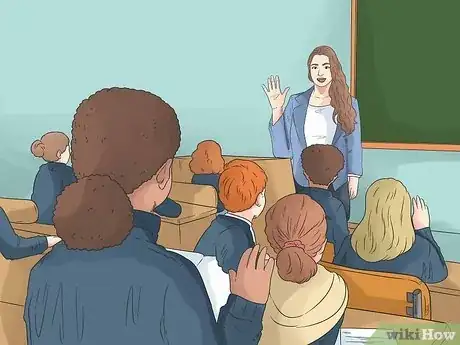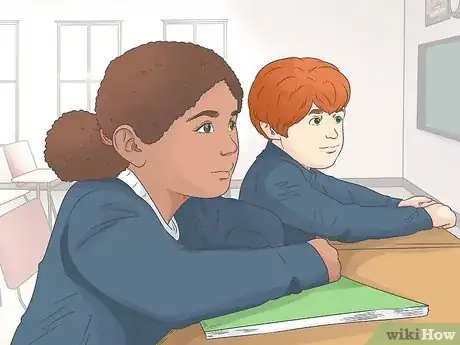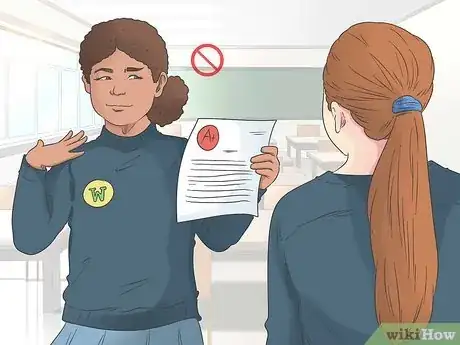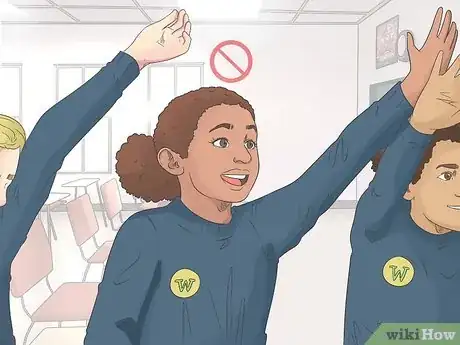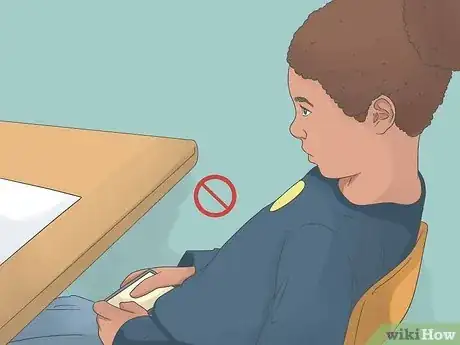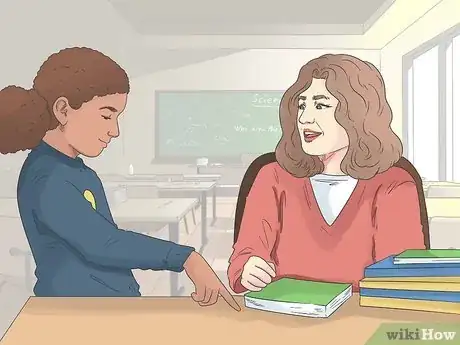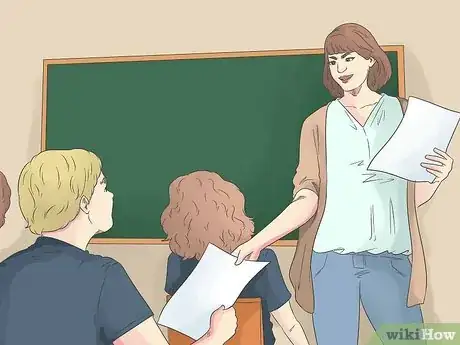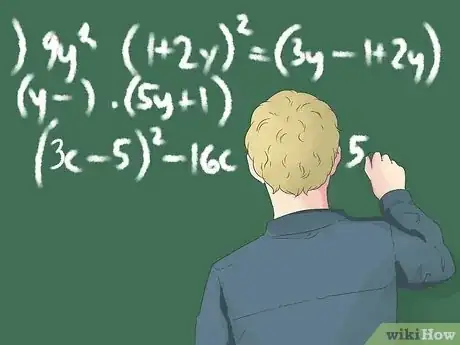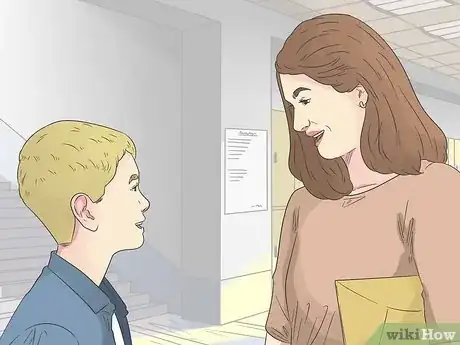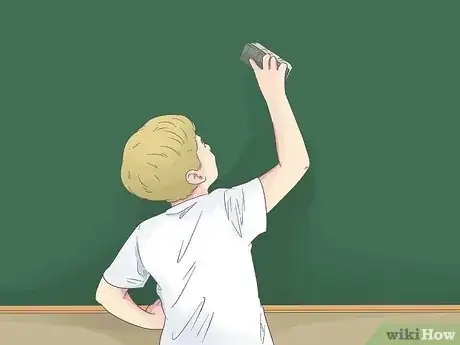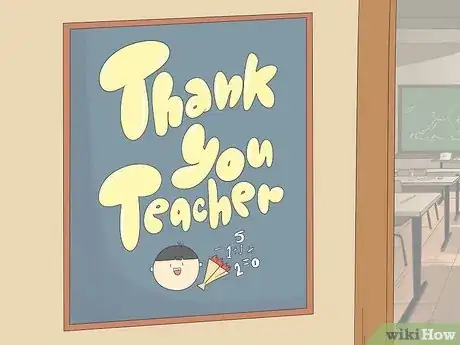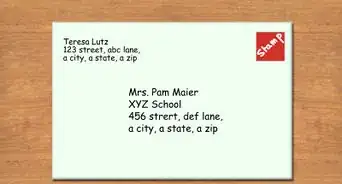This article was co-authored by Daron Cam. Daron Cam is an Academic Tutor and the Founder of Bay Area Tutors, Inc., a San Francisco Bay Area-based tutoring service that provides tutoring in mathematics, science, and overall academic confidence building. Daron has over eight years of teaching math in classrooms and over nine years of one-on-one tutoring experience. He teaches all levels of math including calculus, pre-algebra, algebra I, geometry, and SAT/ACT math prep. Daron holds a BA from the University of California, Berkeley and a math teaching credential from St. Mary's College.
There are 10 references cited in this article, which can be found at the bottom of the page.
wikiHow marks an article as reader-approved once it receives enough positive feedback. In this case, 83% of readers who voted found the article helpful, earning it our reader-approved status.
This article has been viewed 45,675 times.
Whether the subject comes naturally or you struggle to keep up with new concepts, a good connection with your teacher can help you succeed in math class. Connecting with your teacher can also help you secure a valuable academic recommendation for applications to college, scholarships, and study-abroad programs. Your math teacher, like any individual, has a unique personality that you may find either approachable or unfriendly. Nevertheless, if you participate, study hard, and show appreciation to your teacher you can be a favorite student.
Steps
Participating in Class
-
1Raise your hand. When the teacher asks a question that you know how to answer, put your hand up. When you have an opportunity, volunteer to attempt problems on the board in front of your class. The more you participate, the more chances you will have to interact with your teacher and develop a rapport.
- If you are not sure about a question, but no other classmates raise their hand, volunteer to attempt to answer the problem. Teachers typically seek out ways to encourage more participation and will appreciate the example that you set.[1]
- Class participation can be especially challenging or uncomfortable for foreign students. If you are participating in a study abroad or an exchange program, pay attention to how other students participate and mimic their behavior. Don’t be afraid to approach your teacher before or after class to discuss their expectations for classroom participation.[2]
-
2Listen to the teacher. Teachers work hard to prepare lessons and effectively manage classrooms. Show that you appreciate this work by listening closely and focusing on the subject matter. Teachers will appreciate your show of interest in the subject, especially in contrast to other students who may show a lack of interest in the class.
- If you find it difficult to pay attention in class, work to improve your focus. Sitting at the front of the classroom can make it easier to pay attention.[3] Also, regular exercise, adequate sleep, and a healthy diet can all contribute to mental dexterity. You can also use regular meditation to strengthen your focus.[4]
Advertisement -
3Don’t brag or gloat. You will rarely impress teachers or classmates if you gloat or brag about success. Your math teacher especially may be unhappy if you inadvertently discourage your classmates by using your test scores to show that you are better at math than they are. Acknowledge your success, but encourage your classmates by noticing their success as well.
- Avoid trying to attract attention to yourself for being the first finished or for getting the highest grade. There is no need to bring extra attention to yourself. Your teacher will see your success without you gloating. Additionally, overconfidence can hurt your learning.[5]
- You can speak about your accomplishments, but don’t dominate conversations by talking about them at length.[6]
-
4Don't dominate class discussion. Participation is a good way to impress a math teacher, but make sure that other students have their chance to participate. Only talk in class when it is instructed or allowed. If you worry that you participate too much, keep a mental tally and limit the number of times that you raise your hand to five.
-
5Don’t be rude in class. Common classroom behaviors can upset your teacher because they distract other students and show that you are uninterested in the class. Don’t pass notes or talk to neighboring students. Respect other students by listening while they talk in class.
- Avoid using your phone in class. Even if you think you are discrete, your teacher will probably notice.
-
6Ask questions during office hours. If you do not understand part of the assignment or need to clarify a concept from class, try to ask during office hours.[7] Teachers like to address students’ confusion as early as possible. This will also give you a chance to develop your rapport with your teacher.
- If they do not have office hours, ask questions as you leave the classroom. Respect the fact that your teacher may have limited time and keep questions brief and specific.
- If you think other students might have the same question, don't be afraid to ask it during class.[8]
Doing Homework
-
1Complete assignments on time. When you turn in work late, it creates extra work for a teacher. Teachers appreciate receiving each student’s completed work on time as it allows them to determine what material they need to spend more time on in class.
- Remember that math teachers spend significant time and effort determining what homework they assign. You will impress your teacher by showing respect for their judgement.[9]
-
2Show your work on homework assignments. It can be tempting to simply provide the answer if you understand a problem, but it is important to show the process that you used to get your answer. In math, the process used to reach the answer is very important and teachers appreciate when students show that work.
- If in doubt, show more than is required. A teacher will not punish a student for showing a lot of work. In fact, their homework might be used as a class example in a class where most kids fail to show work.
-
3Work on math during class free time. If you are given class time to work on an assignment, start the new assignment or review the old one in class. If you work on other subjects, you can inadvertently signal to your teacher that math is less important to you than other classes. Study for an upcoming test or review previous homework assignments. This will show your teacher that you are interested in the subject that they have dedicated much of their life to teaching.
- You can ask for additional problems if you are enjoying the work. The teacher may be able to give you more challenging problems that will help you understand the material more fully.
-
4Look ahead. You do not need to teach yourself a topic or concept in advance. If you have a rough idea of the lesson ahead, you will be able to engage the material while your classmates are confused. If your textbook came with supplemental materials, use them.
- At home, you can go online and explore multiple sites dedicated to helping you learn math. Keep in mind that different sites will be directed at different age levels and math topics. Ask your teacher if they recommend any particular sites or search for materials by entering the subject and level that you want to explore into a search engine.[10]
-
5Ask for assistance. It can be tempting to try to impress a teacher by never asking for help. Rather than cast a false image of already being an expert, allow your teacher and classmates to help you with specific question. Not only will this help you learn more, it will show your teacher the degree of your dedication.
Acknowledging Your Teacher’s Hard Work
-
1Thank your teacher. The challenge of being a student can dominate your attention, but your teacher works hard as well. Make sure to tell your teacher that you appreciate their work periodically. If they go to extra lengths to help you, acknowledge their extra effort appreciatively.
- Your teacher does many things that you may take for granted. Look for times that you could tell them one of the following: “You really helped me understand that challenging idea, thank you.” “Today’s class was fun, thank you for making it easy to stay focused on the material.” “Your excitement for the subject is contagious!”
-
2Volunteer in the classroom. Offer to help if desks need to be moved, or if the chalkboard needs to be cleaned. Teacher’s often juggle many responsibilities and they will appreciate small efforts to make their day easier. This is a good way to show your appreciation for the person who teaches you.[11]
-
3Have your parents thank your teacher. Encourage your parents to attend parent teacher conferences. While these conferences are primarily about your progress, they provide an opportunity for your parents to acknowledge your teacher’s hard work. Your teacher will likely appreciate the gesture.
-
4Compliment your teacher. Note something unique about your teacher that is not related to math. Compliment their classroom decorations, or something they have done for the school. This will show your teacher that they are appreciated beyond their teaching.
- Appropriate compliments will come naturally once you think about them. Consider statements like: “I really like that art print you hung on the wall,” “It’s so clear that you care about our success,” “I like that you hang your child’s artwork, they are really talented,” or “You are such an important part of the school, you make each day better for so many students.”
-
5Explore the uses of math in other subjects. It can be difficult for some students to express an interest in math since it can be very abstract. If you have trouble finding math interesting, explore how it relates to other subjects and professions. You will find it easier to connect meaningfully with your teacher if you find overlapping interests.[12]
- If you want to study business, ask: “What do you think is the most important math to learn for finance?” If you are interested in sociology, ask: “What do you think are the limits of statistics for understanding human interactions?” If you are interested criminal investigations, you can ask: “How is math used in forensic sciences?”
Expert Q&A
-
QuestionWhat do I do if I'm struggling with math?
 Daron CamDaron Cam is an Academic Tutor and the Founder of Bay Area Tutors, Inc., a San Francisco Bay Area-based tutoring service that provides tutoring in mathematics, science, and overall academic confidence building. Daron has over eight years of teaching math in classrooms and over nine years of one-on-one tutoring experience. He teaches all levels of math including calculus, pre-algebra, algebra I, geometry, and SAT/ACT math prep. Daron holds a BA from the University of California, Berkeley and a math teaching credential from St. Mary's College.
Daron CamDaron Cam is an Academic Tutor and the Founder of Bay Area Tutors, Inc., a San Francisco Bay Area-based tutoring service that provides tutoring in mathematics, science, and overall academic confidence building. Daron has over eight years of teaching math in classrooms and over nine years of one-on-one tutoring experience. He teaches all levels of math including calculus, pre-algebra, algebra I, geometry, and SAT/ACT math prep. Daron holds a BA from the University of California, Berkeley and a math teaching credential from St. Mary's College.
Academic Tutor Don't be afraid to ask for help. Asking questions when you're confused is important. You can ask during class, or you can wait and talk to your teacher during their office hours.
Don't be afraid to ask for help. Asking questions when you're confused is important. You can ask during class, or you can wait and talk to your teacher during their office hours. -
QuestionWhere should you sit in a classroom?
 Daron CamDaron Cam is an Academic Tutor and the Founder of Bay Area Tutors, Inc., a San Francisco Bay Area-based tutoring service that provides tutoring in mathematics, science, and overall academic confidence building. Daron has over eight years of teaching math in classrooms and over nine years of one-on-one tutoring experience. He teaches all levels of math including calculus, pre-algebra, algebra I, geometry, and SAT/ACT math prep. Daron holds a BA from the University of California, Berkeley and a math teaching credential from St. Mary's College.
Daron CamDaron Cam is an Academic Tutor and the Founder of Bay Area Tutors, Inc., a San Francisco Bay Area-based tutoring service that provides tutoring in mathematics, science, and overall academic confidence building. Daron has over eight years of teaching math in classrooms and over nine years of one-on-one tutoring experience. He teaches all levels of math including calculus, pre-algebra, algebra I, geometry, and SAT/ACT math prep. Daron holds a BA from the University of California, Berkeley and a math teaching credential from St. Mary's College.
Academic Tutor Sit in the front of the classroom because it'll help improve your focus. If you already have an assigned seat, ask your teacher if you an switch seats.
Sit in the front of the classroom because it'll help improve your focus. If you already have an assigned seat, ask your teacher if you an switch seats. -
QuestionHow do I get a good night's sleep before school with insomnia?
 Community AnswerGet a thought journal and write down anything that's stressing you out before you go to bed. Don't use devices at least 30 minutes before you're going to sleep. Take a hot bath and get into bed with your journal instead. You can also try drinking herbal tea or asking your parents if they will buy you melatonin, which is an herbal sleep aid.
Community AnswerGet a thought journal and write down anything that's stressing you out before you go to bed. Don't use devices at least 30 minutes before you're going to sleep. Take a hot bath and get into bed with your journal instead. You can also try drinking herbal tea or asking your parents if they will buy you melatonin, which is an herbal sleep aid.
References
- ↑ http://www.educationworld.com/a_curr/shore/shore056.shtml
- ↑ http://www.usnews.com/education/blogs/international-student-counsel/2013/08/22/4-ways-international-students-can-participate-in-class
- ↑ Daron Cam. Academic Tutor. Expert Interview. 29 March 2020.
- ↑ https://www.psychologytoday.com/blog/you-illuminated/201204/brain-scans-show-how-meditation-improves-mental-focus
- ↑ http://www.theatlantic.com/education/archive/2013/12/how-i-help-all-my-students-to-be-good-at-math/281948/
- ↑ http://www.businessinsider.com/10-ways-to-talk-about-yourself-without-sounding-like-a-jerk-2014-3
- ↑ Daron Cam. Academic Tutor. Expert Interview. 29 March 2020.
- ↑ Daron Cam. Academic Tutor. Expert Interview. 29 March 2020.
- ↑ https://thejournal.com/articles/2007/10/22/homework-a-math-dilemma-and-what-to-do-about-it.aspx
